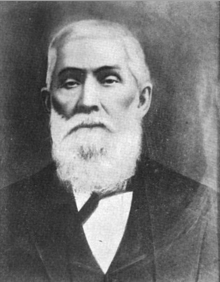William P. Ross
| William P. Ross | |
|---|---|
 |
|
| Born |
William Potter Ross August 28, 1820 Lookout Mountain, Tennessee |
| Died | July 20, 1891 (aged 70) Fort Gibson |
| Nationality | Cherokee Nation |
| Occupation | Lawyer, merchant, politician |
| Known for | Cherokee principal chief |
William Potter Ross (August 28, 1820 – July 20, 1891), also known as Will Ross, was the Principal Chief of the Cherokee Nation. Born to a Scottish father and a mixed-blood Cherokee mother (the sister of future chief John Ross), he was raised in a bilingual home. Ross attended English-speaking schools. He attended Princeton University, where he graduated first in his class in 1844.
Ross served in several different roles in the Cherokee Nation. By then, his uncle had been elected as principal chief. Ross became clerk of the Cherokee Senate in 1843. He became the founder and editor of the Cherokee Advocate. Later, he was appointed director of the Cherkee Male and Female seminaries, then served as Treasurer of the Cherokee Nation.
Ross was chosen to lead the Nation by the National Council on October 19, 1866, and served for several months until the election in 1867. He was later elected to succeed Lewis Downing, and served from 1872 to 1875. After his term ended, Ross retired to Fort Gibson, where he became a merchant and practiced law. He died there on July 20, 1891.
William Potter Ross was the son of John Golden Ross (no blood relation to Chief John Ross' parents), who was born in Scotland December 23, 1787. Little more is known of his parents, except that they emigrated to North America with Will and his sister while the children were very young. The father was swept overboard during a violent storm, and his mother died before the ship reached land. The ship's captain gave the children to a couple in Baltimore who gave them a home. The sister died shortly, but young John grew up in Baltimore, where he attended school and became a cabinetmaker.
John Golden Ross left Baltimore (possibly about the time of the War of 1812), and went to Tennessee by himself. He enlisted in the Tennessee militia and fought in the Creek War under Andrew Jackson. He returned to Tennessee, where he married Eliza Ross. Eliza was part Cherokee, the daughter of Daniel and Mary Ross and sister of the mother of John Ross, who would later achieve fame as Principal Chief of the Cherokees. Eliza had been born near Lookout Mountain on March 25, 1789. The marriage made John G. a member of the Cherokee tribe. He and Eliza settled near Lookout Mountain, where they welcomed their first child, Will, on August 20, 1820.
Eliza began teaching young Will to read at home. The parents were bilingual, so Will learned early to communicate in both English and Cherokee. Later, he attended the Presbyterian Mission School at Will's Valley, Alabama. Then he went to an academy at Granville, Tennessee. When he was seventeen, he went to Hamill's Preparatory School at Lawrenceville, New Jersey. Will's uncle John sent him to Princeton, where he graduated in 1842, scholastically first in his class of 44 men.
...
Wikipedia
